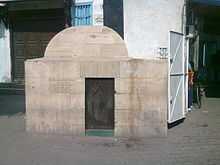Anselm Turmeda

Anselm Turmeda (Catalan pronunciation: [ənˈsɛɫm turˈmɛðə]) or Abd-Allah at-Tarjuman (Arabic: عبد الله الترجمان) (1355–1423) was a Muslim Majorcan writer who was born in Palma. Early in his life he became a Franciscan friar, but converted later to Islam from Christianity[1] and lived in Tunis. He is one of few writers who have written in Arabic and a European language, Catalan, being proficient in both languages. He became a vizier in Tunis, where he died in 1423.
His works
- Llibre dels bons amonestaments
Turmeda dates it to April 1398, eleven years after his settlement in Tunis. It consists of 428 poems arranged in three rhyming stanzas followed by a rhyme-free one. Its preface says it was "composed in Tunis by monk Anselm Turmeda, also called Abdalà". The work was very popular in Catalonia, being called franselm (from "fra [i.e. friar] Anselm").
- La disputa de l'ase
Written in 1417 in Catalan, no part survived in its original language. Current Catalan editions are available based on a medieval French translation. The Inquisition put it on the Index of prohibited books in 1583, contributing to its disappearance. Both for political and religious reasons, it did not square with the orthodoxy of Catholic Spain in the 16th century. It presents a dispute among a donkey and a friar, arguing about the supremacy of men over animals, each one defending their genre. Finally, men win because Christ was incarnated in a man. The work is, however, very critical towards mankind, in all the aspects: religious, moral, political, etc.
- Llibre de tres
This book wants to instruct in an amusing way.
- Tuhfat al-Arib fi al-Radd 'ala ahl al-Salib [English: The Gift to the Intelligent for Refuting the Arguments of the Christians] Arabic: تحفة الأريب في الرد على أهل الصليب (1420)
The best known of his Arabic books, it is a polemical work criticizing the Bible and affirming the prophethood of Muhammad. It had three editions in Arabic, three in Turkish, and one in Persian in a century (1873 to 1971). (Epalza)
References
- ↑ Juan Goytisolo and the Poetics of Contagion, p. 33, by Stanley Beck.
External links
- Page about Anselm Turmeda by the AELC, Association of Writers in Catalan Language. Page in Catalan, English and Spanish.
- Anselme Tourmède, Pourquoi j'ai embrassé l'islam, Perpignan, France: Éditions de la Merci, 2009.
| Arabic Wikisource has original text related to this article: |
|